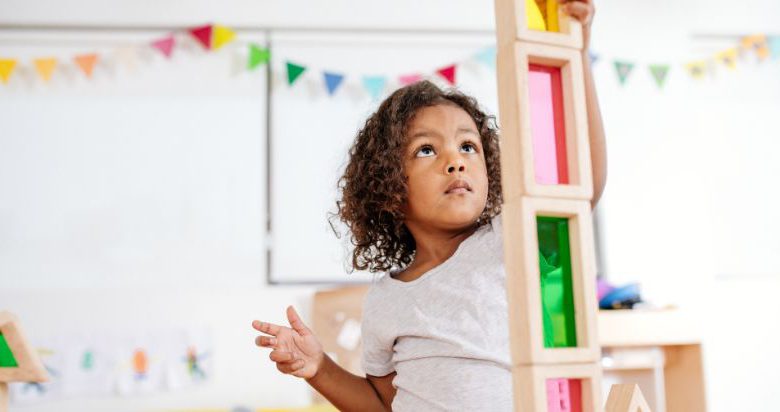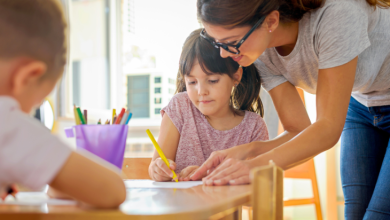The Importance of Play in Early Education: A Key to Childhood Development

The Importance of Play in Early Education: A Key to Childhood Development
At Little Sunshine’s Playhouse and Preschool®, we believe play is the work of childhood. As a cornerstone of our Reggio Emilia-inspired curriculum, we understand the importance of play in early childhood development. Through various forms of play, children acquire fundamental skills and knowledge that lay the groundwork for future achievements.
By engaging children in play, we stimulate cognitive, physical, and emotional growth. Through play, children hone problem-solving skills, improve motor skills and enhance emotional well-being. The significance of play in early education cannot be overstated. When children are engrossed in play, they’re more likely to retain information, develop a love of learning, and foster creativity and imagination.
Play also plays a pivotal role in the development of social skills. Through play, children learn to take turns, negotiate, cooperate, and resolve conflicts—skills essential for building relationships and developing empathy.
Creating a play-rich environment is vital to our mission. We provide a variety of play materials and opportunities, including open-ended toys, art supplies, outdoor play spaces, and structured play activities. By offering a diverse range of play experiences, we support children’s holistic development and foster a love for learning.
The Role of Play in Preschool: Why it Matters for Child Development
Play is not just about fun—it’s a fundamental part of the educational journey. The importance of play in early childhood development is immense. Through play, children gain skills and knowledge that set the stage for future success.
Whether through building with blocks, solving puzzles, or engaging in pretend play, cognitive abilities are honed as children explore, experiment, and imagine. Play is the work of childhood, nurturing social skills such as sharing and cooperation, allowing children to express emotions, develop empathy, and build relationships.
Play also promotes physical activities that develop gross and fine motor skills. Whether running, jumping, climbing, or manipulating toys, children strengthen their muscles, improve coordination, and enhance their overall physical abilities through play.
At Little Sunshine’s Playhouse and Preschool®, we understand the importance of play in early education. Our products encourage play-based learning, supporting holistic development.
Play in Preschool: Facilitating Learning and Boosting Creativity
Play is a critical component of our educational approach. It supports various aspects of learning and development, including language development. Through play, children experiment with words, sounds, and gestures, expanding their vocabulary and communication skills.
Play-based learning activities promote learning in an interactive manner. For example, building blocks teach spatial awareness and mathematical concepts, while art activities encourage creativity and self-expression, all while developing fine motor skills.
Furthermore, play enhances problem-solving skills. Open-ended play presents opportunities for critical thinking, decision-making, and problem-solving. It also cultivates creativity and innovation, encouraging children to think creatively and generate new ideas.
Unleashing Creativity and Imagination Through Play
Imaginative play is a central part of our curriculum, fostering children’s creativity and imagination. It offers numerous benefits contributing to overall development.
Through pretend play, children can step into different roles, developing empathy and understanding different perspectives. This helps to build social skills and deepens their understanding of others.
Encouraging creativity in early education is crucial for enhancing a child’s problem-solving skills. Imaginative play often presents challenges that require creative solutions, enhancing their critical thinking abilities.
Open-ended play materials, such as blocks and art supplies, promote creativity and imagination. Unlike toys with specific functions, open-ended play materials encourage children to use their imagination and create their own narratives, enhancing their creativity and self-expression.
Play in Preschool: Impact on Social Skills Development
Play is a critical factor in social development. Through play, children build social connections, develop empathy and cooperation, and learn how to resolve conflicts positively.
Play allows children to interact, communicate, and form relationships, providing a platform for them to practice social skills such as sharing and taking turns.
Imaginative play or role-playing activities foster empathy, helping children develop a sense of compassion towards others. Cooperative play, such as building blocks or team sports, teaches the importance of working together, sharing responsibilities, and achieving common goals.
Play provides a safe space for children to learn conflict resolution skills. They learn to express their thoughts and feelings, listen to others, and find mutually agreeable solutions. Through play, children develop important social skills applicable in various real-life situations.
At Little Sunshine’s Playhouse and Preschool®, we understand the importance of play in early education. Our toys and games promote imaginative, cooperative, and conflict-solving play. We aim to support children’s social development while providing endless opportunities for fun and learning.
Crafting a Play-Rich Environment in Early Education
Creating a play-rich environment in early education is essential for children’s holistic development. By designing play spaces, selecting age-appropriate play materials, and integrating play into curriculum planning, we can create an environment that promotes learning through play.
Designing play spaces involves careful consideration of the layout and arrangement of the classroom or play area. It’s important to provide play zones catering to different types of play.
Choosing age-appropriate play materials ensures children can fully engage and benefit from their play experiences. For example, infants and toddlers may benefit from toys that encourage sensory exploration and motor skill development, while preschoolers may enjoy puzzles, pretend play props, and building sets that promote cognitive and social skills.
Integrating play into curriculum planning allows for seamless incorporation of play-based activities into daily lessons. By aligning play experiences with learning objectives, we can enhance children’s understanding of academic concepts while fostering their social and emotional development.
At Little Sunshine’s Playhouse and Preschool®, we understand the importance of play in early education. Our range of educational toys and materials are designed to support play-based learning and provide enriching experiences for children, nurturing curiosity, creativity, and critical thinking skills.
For more on play-based learning, check out the following articles:
Play-Based Learning
The 6 Stages of Play
The Surprising Benefits of Imaginative Play





